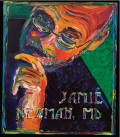Hospital Servi-Sisyphus
It was that kind of morning: hypertensive patients who couldn't pay for their meds and little old ladies, sweet and otherwise, who kept on falling.
He had been a king. Now what was he? Nothing more than a hard manual laborer.
I turned on my pager, threw on my white coat, hung my stethoscope around my neck, and ran up the 3 flights to the morning report room, where the night team was waiting to check out. It was my first day on service after a week off, but it felt like I had never left. Some of the same patients were still there too. There had been 2 readmissions overnight. I knew both of them, since I was the one who had discharged them. The census was much higher than I liked. I had no idea how I'd manage to care for 27 patients, many of whom were new, in 1 shift. One of my colleagues had recently quit, and there was no backup to call in. It was all me.

His back was stiff, his legs sore, his shoulders tight. But he had a job to do.
I started with the patients who had been admitted over the night shift. One of them was a 38-year-old man who was going through delirium tremens for the fourth time this year. His liver function was in shambles, his platelets low, his palms red, and the spider angiomas on his skin were matched by the spiders he hallucinated crawling on the wall. I had admitted him twice before myself, but still I tried to talk to him about quitting, how he was killing himself. He swore he was ready to quit now, but could he just have some lorazepam?
He had deserved this. He was too tricky for his own good. This was his punishment.
In the next room was a patient on the edge of diabetic ketoacidosis. His vows that he was watching his diet and taking his insulin seemed disconnected from his glucose of 589 and glycohemoglobin of 12.8. Still I gave him a quick reminder about compliance, reviewed the long-term complications of diabetes, and talked about diet and exercise and keeping a log book of his doses and levels. He smiled at me and promised he'd keep on trying.
He placed his hands on the enormous rock and began to push.
It was that kind of morning: hypertensive patients who couldn't pay for their meds and little old ladies, sweet and otherwise, who kept on falling. They were overdosed, underfed, depressed, and delirious. They were febrile, tachycardic, and hypotensive. They were amputated, constipated, and intubated. Their sodiums were low and potassiums high, their white counts shifted and red cells microcytic. There were bullae and ulcers, petechia and erythema. Body fluids exuded from all portals. And still they kept coming. Everyone needed antibiotics or pleaded for narcotics. They needed their bellies tapped or their bladders drained. They needed scans or scopes, dialysis and plasmapheresis.
From sunrise to sunset he pushed the boulder up the hill.
Before noon I had discharged 6 patients and admitted 4 more. One had COPD and was still smoking; the other had CHF and was still eating salty food. I shook my head in dismay. What was I doing? It seemed to make no difference. Yet I had to try. I had to diuresis and diagnose. Nebulize and proselytize. Admit and discharge. It was what had to be done, but it was a never-ending battle.
And as the sun began to set, he neared the top. If he could only push a little further this would be all over. But his strength gave out.
Fourteen hours later I sat in my car, exhausted but feeling like maybe I had accomplished something. I drove slowly down the hill, too fatigued to fill the gas tank, or pay my bills, or even bother to rinse my coffeemaker. I collapsed into bed.
The sun came up and Sisyphus stretched slowly, spit on his hands, and walked toward the giant rock that had rolled back down the hill overnight.
The alarm went off. Time for another day on service.



